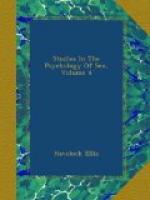At the best, however, although aesthetic sensibility to sound is highly developed and emotional sensibility to it profound and widespread, although women may be thrilled by the masculine voice and men charmed by the feminine voice, it cannot be claimed that in the human species hearing is a powerful factor in mating. This sense has here suffered between the lower senses of touch and smell, on the one hand, with their vague and massive appeal, and the higher sense, vision, on the other hand, with its exceedingly specialized appeal. The position of touch as the primary and fundamental sense is assured. Smell, though in normal persons it has no decisive influence on sexual attraction, acts by virtue of its emotional sympathies and antipathies, while, by virtue of the fact that among man’s ancestors it was the fundamental channel of sexual sensibility, it furnishes a latent reservoir of impressions to which nervously abnormal persons, and even normal persons under the influence of excitement or of fatigue, are always liable to become sensitive. Hearing, as a sense for receiving distant perceptions has a wider field than is in man possessed by either touch or smell. But here it comes into competition with vision, and vision is, in man, the supreme and dominant sense.[129] We are always more affected by what we see than by what we hear. Men and women seldom hear each other without speedily seeing each other, and then the chief focus of interest is at once transferred to the visual centre.[130] In human sexual selection, therefore, hearing plays a part which is nearly always subordinated to that of vision.
FOOTNOTES:
[129] Nietzsche has even suggested that among primitive men delicacy of hearing and the evolution of music can only have been produced under conditions which made it difficult for vision to come into play: “The ear, the organ of fear, could only have developed, as it has, in the night and in the twilight of dark woods and caves.... In the brightness the ear is less necessary. Hence the character of music as an art of night and twilight.” (Morgenroethe, p. 230.)
[130] At a concert most people are instinctively anxious to see the performers, thus distracting the purely musical impression, and the reasonable suggestion of Goethe that the performers should be invisible is still seldom carried into practice.
VISION
I.
Primacy of Vision in Man—Beauty as a Sexual
Allurement—The Objective
Element in Beauty—Ideals of Feminine Beauty
in Various Parts of the
World—Savage Women sometimes Beautiful
from European Point of
View—Savages often Admire European Beauty—The
Appeal of Beauty to some
Extent Common even to Animals and Man.




